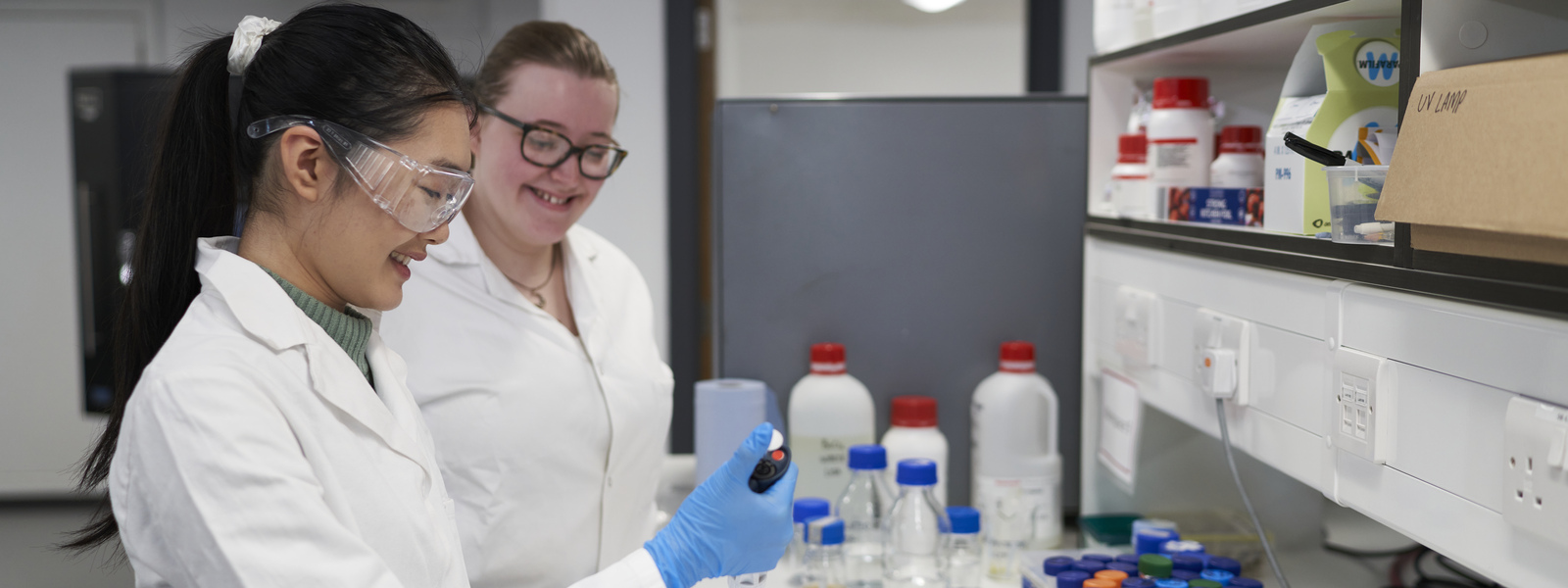
Sustainable StrathclydeStrathclyde Sustainable Labs
Almost 90% of the University of Strathclyde's scientific research is rated “world-leading” or “internationally excellent”, according to Times Higher Education’s analysis of REF2021.
Laboratory-based research, however, is extremely energy, water, and resource-intensive. Strathclyde laboratories contribute to the top ten of the University’s sources of embedded carbon, with laboratory supplies and laboratory consumables being the fourth highest source of supply chain-emissions.
Strathclyde laboratories are responsible for 19% of the University’s total carbon emissions. Our Sustainable Labs Managers engage with staff and students to create greener and safer laboratories. An all-inclusive approach encompassing operational, educational and behaviour change routes has been taken.
Strathclyde Laboratory Carbon Emissions
The total carbon emissions from Strathclyde laboratories (NMIS, CEE, EEE, Physics, PAC, SIPBS, and TIC) amount to 17625 tonnes (including the supply chain). This represents 19% of the total carbon emissions for the University (92584.06 tonnes) in 2018 -2019.
When supply chains are excluded, total laboratory carbon emissions amounts to 7% of total university emissions where electricity contributes to just under half of laboratory carbon emissions (46.9%) followed by heat (25%). SIPBS, Physics and PAC are the top three carbon emitters with SIPBS being the largest, contributing 34% to the total of laboratory emissions.
Clinical Waste Management
In addition to clinical and chemical waste, laboratories also generate waste, particularly from single-use consumables like plastics and glass, as well as packaging waste and electronic waste (e-waste).
To reduce running costs and enhance the lab's sustainability performance, we adopt the 4R principle: Reduce, Reuse, Recycle, and Replace. By carefully considering end-of-life solutions for our laboratory waste, we evaluate the systems and processes involved. Conducting a waste audit is a valuable tool for understanding the composition of our waste stream, which allows us to develop and implement targeted waste reduction and recycling initiatives.
S-Labs PhD Credit Course
The S-Labs PhD Credit Course course aims to introduce students to the environmental impact of lab-based research and the methods by which we can reduce laboratory carbon footprint aiding the university to its net zero goals.
The course provides students with the opportunity to carry out an assessment of their own research environment and contribute suggestions on reducing harmful impacts and improving the safety and sustainability of research activities.
The postgraduate sustainable labs PhD credit course is worth three credits (PGCert RPD Domain C) and is open to all science, physics, and engineering students. The course runs once a year.
Sign up
To sign up, just get in touch with Dr Rabbab Oun at Rabbab.oun@strath.ac.uk.
Content and assessment
It's expected students will complete both parts of the class. However, exceptionally, partial credit may be awarded to those who complete Part A but are unable to complete Part B for good reason, for example, prolonged absence from the University.
| Part A - Sustainability Awareness | Part B - Sustainability Practices | |
|---|---|---|
| Learning Outcome | General appreciation of the potential environmental impact of labs |
Ability to conduct a baseline sustainability audit of a laboratory *Postgraduate research students undertaking theoretical chemistry projects will be offered an alternative, for example, the chance to audit their office environment. |
| Description |
Following an introductory lecture led by the Strathclyde Sustainability Team along with departmental staff, students will undertake an activity to assess the energy efficiency and energy usage of at least five different items of equipment in their own laboratory area. This will be followed by a workshop session where findings will be reviewed and ideas for improvement discussed. |
Students (working either individually or in groups) will undertake a baseline sustainability audit of their own group’s research laboratory using the S-Lab Laboratory Environmental Assessment Framework (LEAF). The aim is to identify and make some general recommendations on where there is scope to improve the sustainability of their own research laboratory. Options for other sustainability topics relevant to the university community could also be considered to be an alternative. |
Engagement Programmes
S-Labs 50% Incentive Fund
To aid our campus to becoming greener and safer, we offer researchers who would like to upgrade their energy, water, and plastic inefficient equipment to better efficient alternatives by covering 50% of the cost. For eligibility and to apply for S-Labs 50% Incentive Fund, please fill out the form.
Laboratory Efficiency Assessment Framework (LEAF)
Developed by the University College London (UCL), Laboratory Efficiency Assessment Framework (LEAF) is a laboratory-based behavioural and educational awareness programme that facilitates lab users to improve the sustainability and efficiency of laboratories without sacrificing research quality.
An Award Scheme is run by Sustainable Strathclyde every year to motivate the participating labs to achieve continuous improvement in sustainability. In 2023, a total of 19 labs received the LEAF Awards 2023, with one for Gold Award and 18 for Bronze Awards.
Join LEAF to support the University reaching the Net Zero goals now!